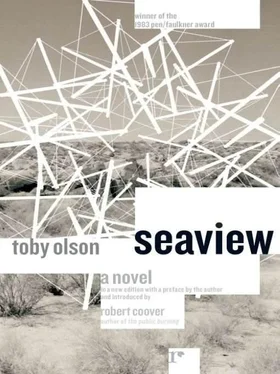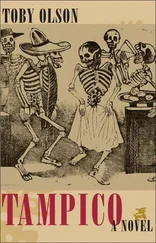It comes around to affect the other sticks in time. The small wires between the sticks are the processes that cause behavior. One end is head process, the other end is, well, you know, the other end, another kind of consciousness — D. H. Lawrence, et cetera.
And it could be something as small as a symbol or a photograph you look at, after many years, that starts the chain, the net, reaction. The focus of the thing, its integrity, is the matrix; this is what we call ‘meaning.’ Out here we analyze it. But in there, when we are one of the sticks, we can’t do that. A breeze pushes against one stick or wire, and we, on the other side, or in the middle, or very close to the one that the breeze pushed, are moved a little. There is no help for it, and we’re moved before we know it. So that knowing is always after the fact of definition. But look how the sticks seem to ache when they are still. They want moving; that’s about all they really have. That is the story I wanted to tell you,” she said, glancing up at Bob White. “I call this story The Integrity Sphere .”
She was out of breath from talking, so she stood quietly beside them, looking into the window. They both seemed able to see the sphere as she saw it; at least, they attended to it. They were in front of an architect’s window in Aspen, Colorado. It was after he had gone to the river where he had let out the cocaine from the plastic bag that had been in the Kansas City Diamond matchbox, let it mix its rush with that of the swift stream. It was after noon. The Buckminster Fuller Tensegrity Sphere was on a piece of dark felt covering a table. It stood there, airy and both powerful and fragile. It was made of quarterinch pieces of pine doweling five inches long, screw eyes, and thin wire. None of the sticks touched each other, and the wires in the screw eyes did not touch the sticks. Gravity seemed to play no part in its structure. It was the structure that was powerful, the materials that were weak. He held her shoulder. Bob White stood on the other side of her. There seemed no room in the sphere for free movement. Open as it was, an open matrix, it seemed claustrophobic to him. He wondered if he could push on it hard enough to break it.
He thought he probably could, quite easily. But what would be left then? She leaned against him. He pressed her shoulder when she finished talking.
“That was a pretty good story,” Bob White said, and then he moved his hands from where they hung at his sides and began a soft clapping in front of his waist. She turned to him, away from the window, and when she did that Allen took his hand from her shoulder and began his own soft clapping also. People passed by them, but the clapping was so soft that they did not notice it. They both bobbed a little as, from either side, they turned in to face her, clapping lightly. They were smiling, breaking into light laughter, and she stepped back from the window a little and bowed a little to each of them as they clapped. As they began to finish they moved closer, in to one another, making a kind of circle. When they were done, they were touching against each other in various ways.
THEY DROVE OUT THE END OF THE TOWN AT FIVE-THIRTY in the morning, before it was completely light, and headed up Independence Pass. At the top they would come to the ridge of the Continental Divide, the watershed; they would be leaving the West then as they descended, and after they had passed through Denver they would enter the plateau entrance into the
Great Plains. They rose up from the town, but before they were high enough to see back to it in its wholeness, they were closed off from it by the mountains.
“It’s gone,” Melinda said as she turned her head back from the rear window.
The pine stands were thick and grew close to the road. There were small meadows of aspen, their leaves shimmering silver as the sun came up. At one point, well back in a meadow behind other trees, they had a glimpse of a ripe cottonwood, like a huge dandelion gone to seed, dropping its puffs in drifts on the light morning wind. The forks of small rivers ran down to turn along the road or go under it, falling away on the other side. After a while, at about eleven thousand feet, they came to timberline; the large trees were gone, and the high meadows of wild flowers and moss and low scrub began. Near the top they passed a ghost town, a long-abandoned mining village: dozens of log buildings returning to the meadow they were in, reclaimed very slowly, a peaceful and nonviolent death, though perhaps of a passionate history. Then they came to the top of the mountains.
There was a sign and a marker and a place to park. Off to the left, up a gradual slope, there was a pile of boulders on a hill, a place that seemed to be the ultimate top of things. With the exception of the hill, at the parking place everything seemed to slope away from them, gradually. The sign said: Independence Pass, Elevation 12,095 feet . They got out of the car and sat at a redwood picnic table near the parking area. They drank hot coffee from the thermos they had brought with them. The air was very crisp and thin, and Melinda was very pale in the sun.
“This is very high up,” she said.
“It is, indeed, very high up,” he said to her.
“Could be higher,” Bob White said, and he took his coffee cup with him and started to stroll up the slope to the pile of boulders.
When he was gone, Melinda put her cup down and began to talk. For the first time in a month, she talked extensively about her dying. She said she thought it was time to take stock some: a lot had happened, and a lot was going to happen. She mentioned the Tensegrity Sphere with a wan smile. She talked about his getting rid of the cocaine, the close call in Tombstone, the sense she had from what he had told her about Richard. Nobody would let this slip, she thought, least of all him. She said she knew there was more to come. She turned toward Allen on the bench, under the few high clouds and the sun. He sat hunched over, elbows on the table, hands cupping his coffee. She said she wanted to get back to the Cape. He said he knew that.
But she said she had to go beyond her concern for him. She had that, but she had really only herself at the bottom. He was a concerned party, but the party he was concerned with would not be there long, and he would have to make his decision, finally, without regard for her. She said all this sounds very romantic, but it is not romantic; it is the way things can be when you are going to die and you know it. Whatever else, she would not use the gun, and she did not want him to use it on her, even if things got really bad. And if somehow he had to leave her, that was okay too. She said she did not mean to sound callous about it; it was simply the way things were.
While he listened to her, looking over at her at times, he thought in part of the impossibility of reading another’s feelings and thoughts in their behavior, in their face and posture and the movements of their body. At least for him it was a difficult thing, difficult to be sure of. Only when he played golf was it all clear and sure. Elsewhere he avoided it, because when he tried to do it he found he was most often wrong. It was especially hard, he thought, with people one had some closeness with. He had had a friend once who had asked it of him, and his inability to see is what had choked off the friendship. If his friend were troubled, he would not speak of it and confide until he was asked about it, and the way you were supposed to know that he was troubled, to unlock him, was to read it in his expression, the way he carried himself, the subtle tones in his voice. If you did not read him, it was because you were insensitive to his feelings. But he had never been able to read people in this way, except on the golf course, where somehow there was a kind of objectivity, a set of brackets, in which he could see behavior clearly and understand it. Too often when his friend sent out his cues, he saw them as a desire for privacy, and he did not engage him.
Читать дальше












